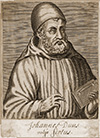Frontmatter
Titlepage
The Ordinatio of Blessed John Duns Scotus
Prologue
Translated by Peter L.P. Simpson
Translator's Preface
This translation of the Prologue of the Ordinatio (aka Opus Oxoniense) of Blessed John Duns Scotus is complete. It is based on volume one of the critical edition of the text by the Scotus Commission in Rome and published by Frati Quaracchi.
Scotus’ Latin is tight and not seldom elliptical, exploiting to the full the grammatical resources of the language to make his meaning clear (especially the backward references of his pronouns). In English this ellipsis must, for the sake of intelligibility, often be translated with a fuller repetition of words and phrases than Scotus himself gives. The possibility of mistake thus arises if the wrong word or phrase is chosen for repetition. The only check to remove error is to ensure that the resulting English makes the sense intended by Scotus. Whether this sense has always been captured in the translation that follows must be judged by the reader. So comments and notice of errors are most welcome.
Peter L.P. Simpson
psimpson@gc.cuny.edu
December, 2012
Contents
Prologue
First Part
On the Necessity of Revealed Doctrine
| Single Question: Whether it was necessary for man in this present state that some doctrine be supernaturally inspired. | Num. 1 |
| I. Controversy between Philosophers and Theologians | Num. 5 |
| A. Opinion of the Philosophers | Num. 5 |
| B. Rejection of the Opinion of the Philosophers | Num. 12 |
| II. Solution of the Question | Num. 57 |
| III. On the Three Principal Reasons against the Philosophers | Num. 66 |
| IV. To the Arguments of the Philosophers | Num. 72 |
| V. To the Principal Arguments | Num. 90 |
Second Part
On the Sufficiency of Revealed Doctrine
| Single Question: Whether the supernatural knowledge necessary for the wayfarer is sufficiently handed on in Sacred Scripture. | Num. 95 |
| I. On the Truth of Sacred Scripture | Num. 99 |
| II. Principal Response to the Question | Num. 120 |
| III. To the Principal Arguments | Num. 121 |
Third Part
On the Object of Theology
| Question 1: Whether theology is about God as about its first object. | Num. 124 |
| Question 2: Whether Theology is about God under some special Idea | Num. 133 |
| Question 3: Whether Theology is about Everything by Way of Attribution of them to its First Subject | Num. 139 |
| I. Preliminary Remarks | Num. 141 |
| II. On the Necessary Part of Theology | |
| A. To the First Question, speaking of Theology in itself. | Num. 151 |
| B. To the Second Question, speaking of Theology in itself | Num. 158 |
| C. To the First Question, speaking of Our Theology | Num. 168 |
| III. On Contingent Theology | Num. 169 |
| IV. On Christ as First Object | Num. 172 |
| V. To the Principal Arguments of the First Question | Num. 183 |
| VI. To the principal Arguments of the Second Question | Num. 192 |
| VI. To the Third Question | |
| A. Opinion of Others | Num. 196 |
| B. Scotus’ own Response | Num. 200 |
| VII. To the principal Arguments of the Third Question | Num. 207 |
Fourth Part
On Theology as a Science
| Questions 1 and 2: Whether theology in itself is a science, and whether it is subaltern-ing or subaltern-ed | Num. 208 |
| I. To the First Question | Num. 208 |
| II. To the Second Question | Num. 214 |
Fifth Part
On Theology insofar as it is a Practical Science
| Question 1: Whether theology is a practical or a speculative science Num. 217 | |
| Question 2: Whether a science is called practical per se from order to action as to its end | Num. 223 |
| I. What Action [Praxis] is | Num. 228 |
| II. How Practical Knowledge is Extended to Action | Num. 236 |
| III. From what Source Knowledge gets its Extension to Action Num. 239 | |
| IV. To the Second Question | Num. 265 |
| V. To the First Question | |
| A. The Opinion of Others | Num. 270 |
| B. Scotus’ own Opinion | Num. 314 |
| VI. To the Principal Arguments of the First Question | Num. 345 |
| VII. To the Principal Arguments of the Second Question | Num. 356 |

